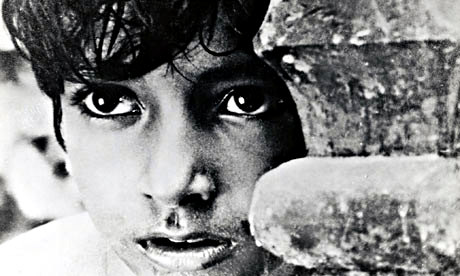LOST DAUGHTER, THE
THE LOST DAUGHTER : MOVIE REVIEW
4.5 STARS OUT OF 5 (OUTSTANDING)
DIRECTOR : MAGGIE GYLLENHAAL
SOURCE NOVEL : THE LOST DAUGHTER, BY ELENA FERRANTE
CAST : OLIVIA COLMAN, JESSIE BUCKLEY, DAKOTA JOHNSON
ENGLISH, 2021
“Motherhood is a crushing responsibility“ – Leda. Hollywood star Maggie Gyllenhaal’s remarkable directorial debut is a sophisticated, sensuous and languidly paced portrait of a lady, teasingly clad in the diaphanous garb of a tantalizing mystery. There’s not much of the latter here, as it is only a ruse to sustain a suspenseful edge. A terrific film production choice by Netflix, and launching off Elena Ferrante’s novel of the same name, what the movie does sport in spades is an unalloyed desire to look at the life of a middle-aged lady (Leda Caruso, expertly essayed by Olivia Colman) as she reflects on the highly difficult time she had raising two kid daughters while juggling an academic career. This flashback is interwoven with her dysphoric vacation in a Greek beach-side. She is not a bad person, but she struggles to make the right choices, and the movie is not so much a dissection as it is a serial display of sensitively etched cross-sections of her many-hued life.
Closing credits are keen to inform us not only of the source novel, but also of its publisher – Europa Editions – probably the first time a movie has been so honest to give credit to both the mother and father of a story.
Leda Caruso (Olivia Colman) is a professor of comparative literature who lives in Cambridge, Massachusetts. At pic’s start, she’s already in a nice Greek beach-side locale on holiday. She does not see herself merely as a teacher, because when the care-taker of her holiday home (Ed Harris portraying not only the said character but also a nice homey version of ‘The Night King’) asks her whether she is a teacher, she says “No, I am a professor”. A beautiful bowl of fruit on the table turns out to be rotten on the underside, and her idyllic water-side repose under a beach umbrella whilst enjoying an ice pop, is rudely ruptured by the arrival of a large, boisterous family who are not itching to be friendly towards her.
Forty-eight year young Leda watches a young, beautiful woman Nina (embodied by a ravishing Dakota Johnson) and her kid daughter in this group, with a mixture of interest and disquiet. It triggers memories of her own earlier life, when she faced repeated storms trying to contend with her own feisty children. Matters are not helped when she has to contend with the matriarch of that family – a lady of age forty-two and seven months gestation, whose pulchritude is further stretched thin by an uncouth, haughty nature that elbows through her surface bonhomie with Leda.
Unencumbered by commercial coercions and untethered by any need for sweet endings, Gyllenhaal is able to go with the honest flow of a chequered life, disclosing both emotional maturity and exquisite movie-making skill to show Leda’s arc, warts kisses et al. If the life of a prick was shown with dysphoric magnificence in Lonergan & Affleck’s ‘Manchester By The Sea’, then this is perhaps the definitive early life climacteric with Gyllenhaal & Colman’s Leda By The Aegean.
The sea’s lulling, lapping waves reflect the movie’s currents, as it sifts through the protagonist, sometimes employing a beautiful stream of consciousness to caress the narrative forward. That rattling multi-coach train of a family no doubt derails her tranquility but the silver lining is that Leda’s gaze periodically catches the nymph Nina and her kid daughter, setting on something to chew on within the observer. Her eye repeatedly snags this fish and fry (the chips come later), nibbling on it throughout to nourish her past and ongoing grievances, the retained hook in the craw digging deeper. On one occasion the little girl goes missing – did she really wander or did someone hide her away ?
The flashback reveals a young Leda struggling to cope with her kid daughters. Kids can lean towards instinctively ricocheting off a scolding tendency, and counter-react and irritate the caregiver even more. Leda always falls prey to this trap - not once do we see her employing a sly, patient, win over with love technique (admittedly easier preached than done). When she has to leave them and go to a conference, she is a bundle of nerves with the baby-sitter instead of coolly handling and enjoying the hand-over enroute to the reprieve. She proceeds from there to totally drive the car off the cliff. The screenplay and direction in this later sequence is lyrically virtuosic, from intimate fantasies to naughty, dirty talk. In ‘Sideways’ I thought people would sympathize with Miles, but the owner of a reputed vineyard took me by surprise when he said, ‘The man who steals from his mother can never be forgiven’. There will be viewers of the ‘The Lost Daughter’ who will not reconcile with Leda no matter how nuanced the movie, but to the film-makers’ credit, her life is presented without judgement. The movie does not ask us to empathize with her – she’s just there in front of us as a person, take it or leave it.
Her good qualities are many. She is an intelligent academic, with a history of colleagues being impressed by her intellectual insights. She can chat up a person perfectly fine when the mood strikes, and even step it up a gear into seduction. Amidst these niceties, pic sneaks in her slight persistent anxiety and streaks of impulsiveness which better illumine a lot of her actions past and present. At a theatre when boisterous rascals disrupt the movie, she reacts angrily at them (as many of us will no doubt do) and later in the sequence she completely blows her top – it’s as if her kid daughters have surfaced again from the depths.
Olivia Colman is note-perfect in portraying Leda, her guarded brooding expression often clouded over with dark reflections, only occasionally giving way to smiles and good cheer. The younger Leda is essayed equally well by Jessie Buckley, her face a tight net of disquiet when dealing with difficult kids, but the corner of the lips curling with admiration and then with excited glee when in agreeable company. Dakota Johnson is an exquisite sea of limpid countenances when her Nina warms up to Leda but Gyllenhaal is unfair to her when she saddles this empyrean doe with some pretty demeaning shades at story’s end. It’s not just Nina - the movie seems to have some cross to bear in general with young people and physically beautiful women.
At pic’s release, The New York Times ran an article underlining how movies that honestly look at emotionally complex mothers are finally making their presence felt (The year before, they also ran an article describing the niceties of a seventy year old daughter taking care of her ninety year old mother. If Leda later turns out to have a nonagenarian mum, I’m sure we’ll get a statement from her about another type of “crushing responsibility”). What mistakes men and women commit, and the judgements and forgiveness we may or may not make up in their honour, is up to each person to think about. ‘The Lost Daughter’ is rightly not interested in asking certain questions or furnishing particular answers. It is however very focused on presenting the facts, and these facts about beach-side vacations are incontrovertible.
UPN
UPNWORLD welcomes your comments.

.jpg)








0 COMMENTS
WRITE COMMENT